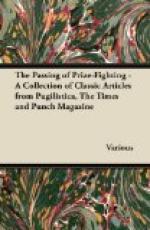If anyone were to take exception to the accuracy of some of the PRIME MINISTER’S historical allusions in his post-Spa oration he would doubtless reply, “I don’t read history; I make it.” He was tart with the Turks, gratulatory to the Greeks, peevish with the Poles and gentle to the Germans. The German CHANCELLOR and Herr VON SIMONS were described as “two perfectly honest upright men, doing their best to cope with a gigantic task.” Their country was making a real effort to meet the indemnity; it was not entirely responsible for the delay in trying the war-criminals, and even in the matter of disarmament was not altogether blameworthy. The Bolshevists also were handled more tenderly than usual. Their reply was “incoherent” rather than “impertinent”—it might have been drawn up by a WEDGWOOD-KENWORTHY-CECIL-BOTTOMLEY-THOMAS syndicate. Still they must not be allowed to wipe out Poland, foolish and reckless as the Poles had been.
A well-informed speech was made by Mr. T. SHAW, evidently destined to be the Foreign Minister of the first Labour Cabinet. Having travelled in Russia he has acquired a distaste for the Soviet system, both political and industrial, and is confident that no amount of Bolshevist propaganda will induce the British proletarian to embrace a creed under which he would be compelled to work.
Thursday, July. 22nd.—The Peers held an academic discussion on the League of Nations. Lords PARMOOR, BRYCE and HALDANE, who declared themselves its friends, were about as cheerful as JOB’S Comforters; Lord SYDENHAM was frankly sceptical of the success of a body that had, and could have, no effective force behind it; and Lord CURZON was chiefly concerned to dispel the prevalent delusion that the League is a branch of the British Foreign Office.
The Commons had an equally unappetising bill-of-fare, in which Ireland figured appropriately as the piece de resistance. Sir JOHN REES’ well-meant endeavour to furnish some lighter refreshment by an allusion to the Nauru islanders’ habit of “broiling their brothers for breakfast” fell a little flat. The latest news from Belfast suggests that in the expression of brotherly love Queen’s Island has little to learn from Nauru.
* * * * *
A SCENE AT THE CLUB.
I never liked Buttinbridge. I considered him a vulgar and pushful fellow. He had thrust himself into membership of my club and he had forced his acquaintance upon me.
I was sitting in the club smoking-room the other day when Buttinbridge came in. His behaviour was characteristic of the man. He walked towards me and said in a loud voice, “Cheerioh, old Sport!”
I drew the little automatic pistol with which I had provided myself in case of just such an emergency, took a quick aim and fired. Buttinbridge gave a convulsive leap, fell face downwards on the hearthrug and lay quite still. It was a beautiful shot—right in the heart.




